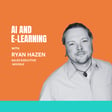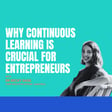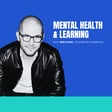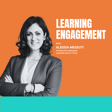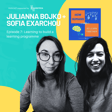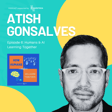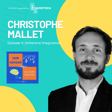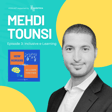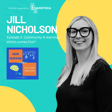Become a Creator today!Start creating today - Share your story with the world!
Start for free
00:00:00
00:00:01

Slow Learning
Looking at existing learning and training modules, how might we address learning limits with a snail-like pace to make learning more sustainable?
Featuring Delphine Dall-Agata of ITCILO, producers of the book Slow Learning available here.
Transcript
Introduction to Slow Learning
00:00:00
Speaker
We live in an age of information overload, ever accelerating technologies, and split second learning. Citizens, learners, and workers today are required to continuously reskill, upskill, and new skill to keep up with this new pace. How might we slow down in this sped up society to make learning a more human experience? That is the opening introduction to the book, Slow Learning.
00:00:30
Speaker
and the question we're going to look to answer slowly in this podcast series. I am Lauren Anders-Brown, your host for this episode. You're listening to How Humans E-Learn Together, discussing the impact human-connected interactive experiences have on the human capacity to learn. This is a podcast for trainers, educators, learning and development professionals, coaches, and mentors.
00:00:58
Speaker
the education technology community, and anyone who wants to leverage new ways to reach lifelong learners, and to look at what others in the e-learning industry are doing to make that happen.
Meet Delphine Delagata
00:01:11
Speaker
Today, I'm speaking with Delphine Delagata. Hi, Lauren. Delphine is one of the curators and contributors to the book, Slow Learning. So mindful, when your mind is full,
00:01:24
Speaker
basically when we are consumed by our thoughts of the past and our worries about the future. While being mindful, which is one word, is when we're aware, present, in the moment, and accepting what is happening without judgment. She works for the International Training Center of the International Labor Organization. With a title like that, I'm going to allow Delphine to introduce herself.
00:01:55
Speaker
Thanks, Lauren. So yes, that is definitely a mouthful. The International Training Center of the International Labor Organization, or ITC ILO might be easier for us to say, is basically the training branch of the ILO. We are the learning and training provider
00:02:17
Speaker
for all things related to decent work and social justice. I am an associate program officer in the learning innovation program. And in this program, we tackle all things related to innovative learning technologies, methodologies, and communication for the future of work. So we're based here in Turin, Italy, in the north of Italy,
00:02:44
Speaker
And although slow is not really part of our mission, I would say the campus that we're on has a bit of a slow quality. We're on this kind of lush green campus along the River Po. There are birds and squirrels running around. So it's quite a slower rhythm, I would say, compared to the upbeat city that we're in.
Understanding Slow Learning
00:03:05
Speaker
the atmosphere you just described, Delphine, was that at all an inspiration to some of the things that are going on in Turin, for example, like the slow food movement and your book? Absolutely. So if someone's not familiar with the slow food movement, it actually started back in the 1980s. A man by the name of Carlo Petrini and a group of activists
00:03:28
Speaker
demonstrated in the Spanish steps in Rome, Italy, where a McDonald's was actually supposed to open. And this kind of kicked off this opposition to fast food and the switch over to slow food. I think Italian culture is inherently slow when it comes to food and the slow food movement kind of paved the way for this good, clean, fair mission.
00:03:53
Speaker
And Piedmont, the region that Turin is actually in, in Italy, has become kind of the slow food headquarters of this movement. And so since the ITC-ILO is located in Turin, we thought, how could this be applied to learning?
00:04:10
Speaker
Now, if you look up slow learning on Google right now, you'll get a lot of responses linked to how some learners think or develop knowledge at a slower rate than his or her peers. And we wanted to change that narrative because slow learning can also be about making a conscious decision to spend more time discussing topics, reflecting and digging deeper. So we started off with this with the idea
00:04:41
Speaker
And we did a brainstorming session with a lot of slow advocates. And this eventually led to the book. But this was a bit of the context of where we got our ideas for this book. You know, Delphine, you just brought me back to my time in Italy when I studied in university. And my very first morning, going down before I was going to go to my class, I went to the cafe just below where I was living. And I asked for
00:05:12
Speaker
And they looked at me like I had three heads because I asked for a coffee to go. And they didn't understand. I have repeated myself a second time. I thought maybe my pronunciation was wrong or I just wasn't clear.
00:05:26
Speaker
Nope, they heard me correctly the second time and I was served a coffee in a plastic cup because that was all they had because the idea of taking a coffee to go just did not exist then. You sat down in the morning and you had your coffee and you took in everything that happened in
Cultural Insights from Italy
00:05:44
Speaker
those moments. And as we know, coffee in Italy
00:05:46
Speaker
It goes by quite quickly. So actually taking that little moment to pause every morning kind of taught me something. And it's a different way to kind of start my day and not always have to be doing multitasking a couple things at the same time, right? Absolutely. And to-go cups still do not exist in Italy, I can confirm.
00:06:08
Speaker
And here, actually, at work, when I first moved to Italy as well, I had a similar experience. I personally don't drink coffee. So when they would say, do you want an espresso? I would say, no, thank you. And they would kind of freeze and be like, OK, I guess I'll go by myself.
00:06:25
Speaker
And what I wasn't realizing at the time is that I was also kind of closing off an opportunity, as you said, to socialize, to get to know that person better. So since then, I still don't drink Italian espresso, surprisingly, but I've learned to take a decaf and be open to that moment of pause, as you said, and socialization.
00:06:43
Speaker
Yeah, or it's just even inviting you to the table.
Learning Rights and Principles
00:06:47
Speaker
Whether you have an espresso or not is another question, but it's taking that moment to pause, which I think is something that we haven't, has not been instilled in our society as of late. And I think we're kind of finding through this book, getting back to you. So let's talk about the book. It mentions a Bill of Rights, which is an American I love.
00:07:07
Speaker
Um, and I'd like to share for our audience and I'm going to, I'll say each of each of the bills. And, um, if you don't mind just kind of briefly expanding on each of the rights, uh, in, in how you want people to take from the book, I'm going to say each of the rights. And if you don't mind just expanding on each one for me. Sounds good. One focus on direction, not destination. So number one is all about realizing that your learning journey is not linear.
00:07:34
Speaker
It's important to have an objective, but also to focus on the journey without kind of getting trapped in that I'll be happy when syndrome. So grow through what you go through. Ah, I like that.
00:07:48
Speaker
And two, raise your hand. So number two is an invitation to stay curious. I find in our society today, we value perhaps answers over questions, but I find that questions in reality are, I would say a higher demonstration of your knowledge and wisdom. Being able to craft a complex question allows for creative thinking and innovation to unleash. So don't be afraid to raise your hand.
00:08:18
Speaker
Okay, number three, learn at your own pace. I think we all know that comparison can sometimes be toxic. So learning at your own pace is all about finding your own rhythm and putting yourself first as a learner, because in the end, you are the one seeking to acquire this new knowledge. It's kind of like self-love, but for the brain.
00:08:41
Speaker
And so learning at your own pace is about being better than you were yesterday, but also inviting that own rhythm to set in and giving yourself the time you need to acquire that new knowledge. Which is something that we weren't always afforded in school, right? For sure. And I think sometimes society prizes this kind of acceleration, this bite-sized learning approach and
00:09:08
Speaker
Everyone has their own speed at which they let knowledge seep in. So I think allowing for those conscious pauses are fundamental. So four is unplug, which is a bit of an irony since we're talking about how e-learning is used to connect people. Can you explain what you mean by unplug? So I think it's important to stress that everyone has the right to disconnect, whether we're talking about learning or working.
00:09:36
Speaker
And sometimes a digital detox can allow what we're learning perhaps in an e-learning or online format to seep in further. What I mean by this sometimes is also to avoid distraction, to be very intentional with our learning because sometimes the fact that it's digital and online can mean that your phone is going off, that you're getting notifications.
00:10:01
Speaker
So even if you are connected in a way, make sure you are intentional about what you're learning and give yourself time to chew on thoughts to make sense of information. So it's okay to keep using technology, but you know, not to overuse it. I like that. Yeah. Be intentional and be conscious of I think is the takeaway there. Five, change your learning path and mind. So here it's all about keeping the brain agile.
00:10:27
Speaker
In the end, I mean, you are the one who decides what you are going to learn. So think also outside of your comfort zone and don't be afraid to let things go. One common quote about innovation is that it can be about either doing things differently
00:10:46
Speaker
or doing different things. So giving that space to change direction and also change your mind. Number six, which kind of reminds me of number four, but I'd love to hear the difference. Take a break. So I think here we're focusing more on informal learning. Sometimes spontaneous moments, like as you mentioned earlier, coffee breaks or lunch breaks or exercise breaks can allow ideas to form
00:11:17
Speaker
So here it's all about the right to rest. Sometimes the best ideas come when we're not actively thinking about them. I know personally I commute to and from work by bike and those moments for me are sacred because in the morning it allows me to kind of
00:11:35
Speaker
set the pace for the day, kind of review what's to come and let my mind wander. And on the way home, it's about kind of processing what went right, what went wrong and letting go of things that can no longer serve me. And maybe also ideas pop up of things that I was thinking of during the day, didn't find a solution to, but suddenly I get a breakthrough on the bike ride home. So taking a break can actually be productive.
00:12:02
Speaker
Yeah. And this is especially, I find as a creative person, this is especially important to be able to take a break because oftentimes that is how your next inspiration or your next idea comes. So I think that one's really important. I know for me, seven, make mistakes.
00:12:17
Speaker
So here I often think about something that my boss, Tom Wambika in the learning innovation program often says is that fail is actually the first attempt in learning. So FAIL is the first attempt in learning. And here it's all about trying, taking risks and not being afraid to make a mistake because
00:12:43
Speaker
When we fail, we can fail again, but we might also fail better. I think those are kind of lessons in resilience. So not being afraid to try and allowing that space for growth, I think is super, super important and something I really value at work, but also on my learning journey. I like that. Number eight, leave it unfinished. I don't know how much I agree with this one, so you definitely need to convince me of it.
00:13:13
Speaker
So for sure, I mean, procrastination, I think, has a pretty negative connotation in our society. But I also think that perfection is a myth. In the end, beauty is in the eye of the beholder. And of course, I mean, don't neglect your deadlines and any kind of time management skills. But I think it's also important to allocate time to let thoughts simmer. I think it's much more meaningful to have
00:13:43
Speaker
a impactful work in progress rather than this kind of rushed final product so i think here we're not saying of course like drop everything and give up but allow enough time for an idea for a thought
00:13:59
Speaker
develop enough to have meaning when it's produced and final. Almost like drop the perfectionism. Yeah, that could be another way of interpreting leave it unfinished and I think also it's really important to get feedback and other ideas from other people because what they might think is perfect for you might be different so
00:14:21
Speaker
You know, everything has, it's part of the journey as kind of set in the first one. So allowing for every step to be considered kind of a meaningful product and not only kind of rushing to that final step.
Slowing Down for Better Results
00:14:35
Speaker
All right. Nine. Unlearn and forget. Here, I think an important quote is that the illiterate of the future
00:14:45
Speaker
are not those who cannot read and write, but those who cannot learn, unlearn, and relearn. So here it's really important to stay open and adaptive. Again, as I said earlier, you have control of what knowledge stays or leaves your brain. So sometimes it's when you feel it's time to let something go, then it's OK. And you make space for new learnings, new thoughts, new trains of thought.
00:15:14
Speaker
So that's what unlearn and forget is all about. And our final one, 10, slow down. 10 encapsulates, I would say, what the other nine are about. And then we've all heard about the tortoise and the hare and how slow and steady win the race. So here it's all about de-accelerating consciously. So knowing when is the right time to slow down and how sometimes slowing down can lead you to better results.
00:15:43
Speaker
There's a quote in French actually that says, which means to back up, to jump better. So I think 10 is really important to look at the bigger picture and realize where you're going and where you can allow space to simmer on thoughts and process information.
00:16:04
Speaker
Also, as someone who owns a turtle, I can say that my turtle's pretty fast. And so all of that understanding that a turtle is always slow, that reiterates to me that assumptions are dangerous. I cannot leave him unattended on his own in the garden or he will just completely run off.
Insights from Violin-Making
00:16:23
Speaker
And so I do wish he would slow down a bit sometimes. This actually makes me think when I was
00:16:30
Speaker
In school, I was a part of choir for quite some time, and often they would use the duck analogy as something that you see on the top of the water as kind of slow and serene, but underneath is pedaling madly to keep going forward. So it's this kind of, yeah, these stark contrasts that allow you to move forward, what may seem a slow and steady on the outside, and reality can be actually quite quick and frantic on the inside.
00:16:57
Speaker
So everyone has their way, every creature, I would say, has their own way of moving. And yeah, tortoises alike can also be quite quick. Absolutely. And appearances are deceiving, you know. In the book, there's lots of different essays and pieces of art, which I actually really loved, that coordinated and went with some of the essays. And I really loved the punctuated artistry essay that you wrote, Delphine.
00:17:21
Speaker
mostly because I use lots of commas and clearly not enough semicolons in my life, because I'll worry I'll use them imperfectly. Could you share a little bit about your essay with us? So as you mentioned, the kind of second portion of the book after the Bill of Rights are a series of essays from slow advocates that we had during the brainstorming session and beyond in the creation of the book. And each contributing author had the question, what does slow learning mean to you?
00:17:52
Speaker
and they received an image. And these images are quite compelling graphics. They were from a competition based here in Turin called Poster Heroes that's launched every year on a different social impact topic. And they have a huge network of artists throughout the world. And that year, the topic actually was mindful or mindful. And so each author received
00:18:18
Speaker
one of these images to kind of spark their inspiration on what slow learning means to them. And mine in particular was a was a comma, and then it was a semicolon turned into kind of a final graduated student. So it was kind of this analogy of how learning can slow learning can lead to a big impact.
00:18:42
Speaker
And the essay actually travels back a few years in my life to a small town called Cremona, which is near Milan in the north of Italy. And Cremona is quite famous for the Stradivarius violin. Have you heard of the Stradivarius violin? I took the violin when I was younger and I actually had a copy of one, believe it or not.
00:19:07
Speaker
Wow. Okay. Those are precious instruments. Not an original. It was a copy to be fair, but yeah, I still have it. Wow. Wow. Yeah. Hold that tight. Because actually, so Antonio Stradivari was the violin maker in this small town in Cremona in like the 17th, 18th centuries. So quite a ways back.
00:19:31
Speaker
And he created violins. And these instruments are still alive and well in the world of music. And just to give an idea, the most recent one I think that went on auction went off for $20 million. So they're quite expensive, precious instruments. And in this small town, there is the International School of Violin Making, which is continuing this tradition of this craft.
00:19:59
Speaker
And it's a magical, magical place. I actually spent a year teaching English in this school. It was my first job out of college. And I was mesmerized by this conscious construction of time that you felt.
00:20:14
Speaker
in those workshops. You had this smell of oil varnish and maple shavings. There were all these wood benches with this soft light where each student would be working with their piece of wood to transform it into a violin. And in addition, there would be kind of the violin master, the Liutaiyo, it says in Italian, that would be passing from bench to bench, giving guidance and suggestions to each student. I mean, this is
00:20:43
Speaker
a wild concept, if you're so used to maybe a more standard education, because they're making an instrument out of a piece of wood. It's, I mean, it's physics, it's musicality, it's woodcraft, all mixed into one. So that really inspired the essay on slow learning. And it's actually where I brought the learning innovation program at the ITC ILO to visit, and where we had some of the initial brainstorming sessions on the final book.
00:21:11
Speaker
So it's really a wonderful, magical place inside this workshop that has, you know, one of the few 400 year old crafts that is still alive and well, like machine still hasn't replaced this process. So it was really an invitation to contemplate like a comma or study like a semicolon and it's still
00:21:34
Speaker
is a reminder to myself to sometimes speak slower and allow for a slower rhythm in learning and in life in
Meditation and Mental Health
00:21:43
Speaker
general. So other than those few tools that you just shared, are there any others that you practice and that you use in your daily life? So yeah, at the end of the book, there are a series of 10 tools that can be used for both learning and living in general.
00:22:01
Speaker
And the 10th one is actually meditation. And I don't do it daily. Perhaps I should. But I definitely use this in moments of stress to kind of reset the nervous system and focus on the now. And it's really incredible what just 5, 10, 15 minutes of a guided meditation or a breath work exercise can do for your mental and physical health.
00:22:32
Speaker
Studies have shown how meditation can lower anxiety levels, improve sleep, improve the attention span, and overall boost mental and physical health. So I think meditation is one of those tools that if introduced already in schools and in education programs,
00:22:55
Speaker
can lead to more healthy learners in the future. And it's an invitation to use both in personal and professional life for actually launching what we call slow retreats here at the ITC-ILO, which are opportunities for teams to come together and slow down and doing a mixture of kind of the tools that are shared at the end of the book and allowing
00:23:20
Speaker
for teams to kind of back up to jump better, as I mentioned earlier, and do this collectively in a slower rhythm. I agree with you. I find meditation to be really helpful and I even do a weekly session on Zoom. So, you know, being able to
00:23:37
Speaker
Even though it's a very solitary event, being able to kind of A, carve out the time and B, know that I'm not trying to do this thing alone because meditation is actually quite hard when you have a busy mind. But I find it to be really useful to kind of help reset every week and to be able to share that experience online, which I mean, we're all just kind of have our eyes closed and we're all listening to the same kind of guided process together.
00:24:04
Speaker
It really makes a difference, I'd say, in slowing down the start of my week.
Exploring the Socratic Walk
00:24:09
Speaker
For anyone after listening to this podcast that might be interested in slow peer e-learning, are there any good examples that our listeners could engage with to get started with this? I think if you are an educator, facilitator, trainer of any sort or a learner yourself, there's one tool that I really love that's in the book and it's called the Socratic Walk. It might sound very high end, but in reality, it's quite simple.
00:24:39
Speaker
Basically, one person talks and walks while their peer actively listens and asks some specific questions while also walking.
00:24:54
Speaker
So it's basically an application of critical thinking, again, building off of both online and offline approaches because it can be done in person or it can be done if you're linked up in a breakout room on Zoom with one other person, as long as you're able to move and walk.
00:25:11
Speaker
And it trains you to actively listen to what the person is saying. You're not trying to get anything out of them. They usually be focused on a specific topic and it trains you to listen and just let them go through their train of thought.
00:25:28
Speaker
And it's a really meaningful experience. The first time I came in contact with it, I was actually a participant. And the person that I was connected with, I had never spoken to before. And she actually worked in the same organization. I had just never had the chance to speak with her. And since then, I feel like I have a heightened knowledge about her career, her ambitions, her personal life. And it built a deeper connection in just those 30-minute
00:25:58
Speaker
just that 30 minute exchange. So it really flexes your empathy muscle, allows you to gain knowledge from another person in a kind of critical way almost because you're giving that space to listen and to just build that connection. And this can be used in any course. I mean, based on the topic of the learning or e-learning opportunity, you can modify it
00:26:26
Speaker
to narrow down on a specific experience, specific question, and then just invite for that moment of peer-to-peer exchange.
Conclusion and Engagement
00:26:32
Speaker
This episode is going to be a lot to learn slowly. Thank you Delphine. And if you're interested in reading the book and seeing the beautiful artwork included in it, you can get yourself a copy by heading over to the blog that features the book on the Gamoteca website at gamoteca.com.
00:26:51
Speaker
If you'd like to get in touch with us regarding today's episode, or there is something you'd like to learn about on a future episode, send me an email, Lauren at Gamoteca.com. That's all for this episode on how humans e-learn together, supported by Gamoteca. Until next time. Goodbye. Ciao.
